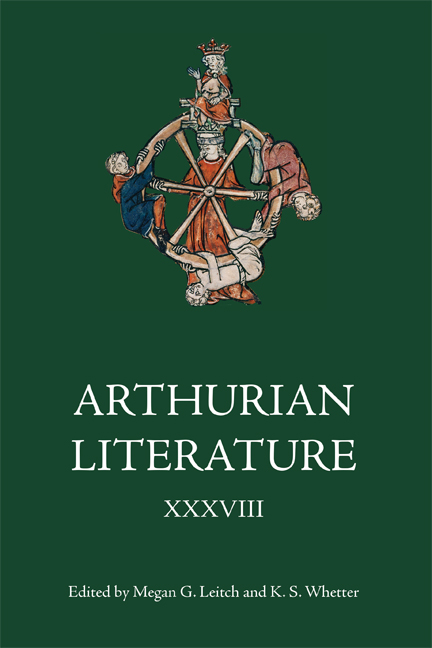Book contents
- Frontmatter
- Contents
- List of Figures and Tables
- Note on the Derek Brewer Prize
- General Editors’ Preface
- List of Contributors
- List of Abbreviations
- 1 The Inaugural Derek Brewer Essay Prize: Animals at the Feast: Strange Strangers and Courtly Power in The Wedding of Sir Gawain and Dame Ragnelle
- 2 The Kindred of a Boy without a Father: Merlin’s British Forebears and Irish Cousins
- 3 Geoffrey of Monmouth’s Subtle Subversion: Active Double- Voiced Discourse in the Historia regum Britanniae
- 4 ‘Cornwall, up in the North’: Geography and Place Names in the Source of the Old Icelandic Brut
- 5 Enacting Arthurianism in the Order of the Garter and Sir Gawain and the Green Knight
- 6 Deviants and Dissenters: Theorizing Shame and Punishment in Malory’s Morte
- 7 Loyalty and Worshyp in Conflict in Malory’s Lancelot
- 8 Emotional Inheritance in Malory’s Morte Darthur: Shame and the Lott–Pellinore Feud
- 9 Navigating and Indexing Arthurian Romance in Benoît Rigaud’s Edition of Lancelot du Lake (1591)
- 10 ‘A great many strange puppets’: Queen Caroline, Merlin’s Cave, and Symbolic Arthurianism in the Age of Reason
- 11 How Galahad Regained his Virginity: Dead Women, Catholicism and the Grail in Nineteenth-Century British Poetry
- Notes
- Miscellaneous Endmatter
6 - Deviants and Dissenters: Theorizing Shame and Punishment in Malory’s Morte
Published online by Cambridge University Press: 10 January 2024
- Frontmatter
- Contents
- List of Figures and Tables
- Note on the Derek Brewer Prize
- General Editors’ Preface
- List of Contributors
- List of Abbreviations
- 1 The Inaugural Derek Brewer Essay Prize: Animals at the Feast: Strange Strangers and Courtly Power in The Wedding of Sir Gawain and Dame Ragnelle
- 2 The Kindred of a Boy without a Father: Merlin’s British Forebears and Irish Cousins
- 3 Geoffrey of Monmouth’s Subtle Subversion: Active Double- Voiced Discourse in the Historia regum Britanniae
- 4 ‘Cornwall, up in the North’: Geography and Place Names in the Source of the Old Icelandic Brut
- 5 Enacting Arthurianism in the Order of the Garter and Sir Gawain and the Green Knight
- 6 Deviants and Dissenters: Theorizing Shame and Punishment in Malory’s Morte
- 7 Loyalty and Worshyp in Conflict in Malory’s Lancelot
- 8 Emotional Inheritance in Malory’s Morte Darthur: Shame and the Lott–Pellinore Feud
- 9 Navigating and Indexing Arthurian Romance in Benoît Rigaud’s Edition of Lancelot du Lake (1591)
- 10 ‘A great many strange puppets’: Queen Caroline, Merlin’s Cave, and Symbolic Arthurianism in the Age of Reason
- 11 How Galahad Regained his Virginity: Dead Women, Catholicism and the Grail in Nineteenth-Century British Poetry
- Notes
- Miscellaneous Endmatter
Summary
Malory's fifteenth-century audience and contemporary scholars and readers of the Morte Darthur are aware that most knights, at some point in the narrative, fail to live up to the standards of knighthood. This observation is reinforced in part by our understanding of this chivalric group's reputation and identity as articulated in the explicit parameters that regulate their behavior. Elizabeth Archibald, building on the work of P. J. C. Field, D. S. Brewer and Terence McCarthy, has emphasized Malory's intentionality in creating a cohesive community reinforced through the author's creation of the Pentecostal Oath. The importance of the Oath is arguably strengthened by the fact that it is Malory's addition to his literary sources, even if it seems to come from the investiture of the historical Knights of the Bath.2 Both the audience's and the characters’ expectations of knightly behavior in the Morte are outlined explicitly in the Round Table or Pentecostal Oath, which many scholars take as a template for proper knightly behavior and identity in the Morte. For instance, Launcelot's famous remarks in response to the crimes of Perys de Foreste Savage, ‘is he a theff and a knyght and a ravyssher of women? He doth shame unto the order of knyghthode, and contrary unto his oth’, (205. 6–7) mirror Malory's modern audience's expectation that knights in the Arthurian world should behave in a suitably chivalric fashion. Lancelot's comment also focuses on the idea of shame, which underpins the narrative's persistent attention to knightly identity and conduct. There are numerous motivators that drive a knight's performance throughout the Morte, among them prowess, worship, and solidarity with the chivalric community. The possibility of bringing about shame to oneself or to the order of knighthood, to which Lancelot's reference to Perys's breach of the chivalric oth alludes, is also a stimulus for proper knightly behavior as seen throughout the Morte.
The intersection between shame and identity is made especially clear in Malory as knights of the Round Table reconcile their position within the chivalric community with other identity groups, such as parent, brother, nephew, lover, and Christian. In other words, a knight can also align himself with other groups that have their own sets of rules, values and structures.
- Type
- Chapter
- Information
- Arthurian Literature XXXVIII , pp. 156 - 187Publisher: Boydell & BrewerPrint publication year: 2023



